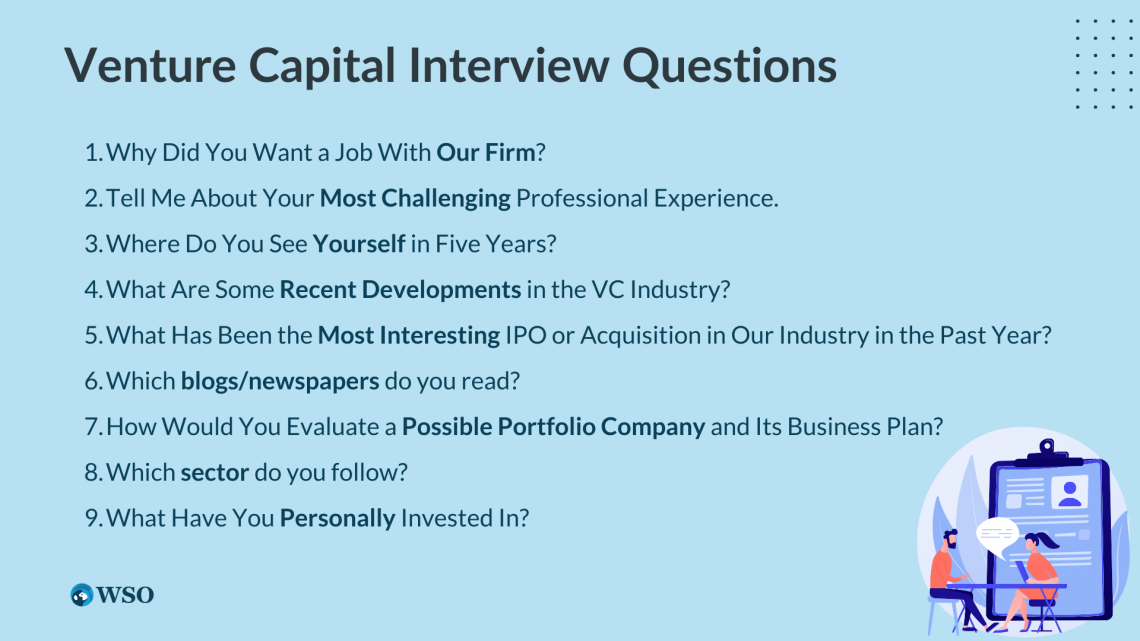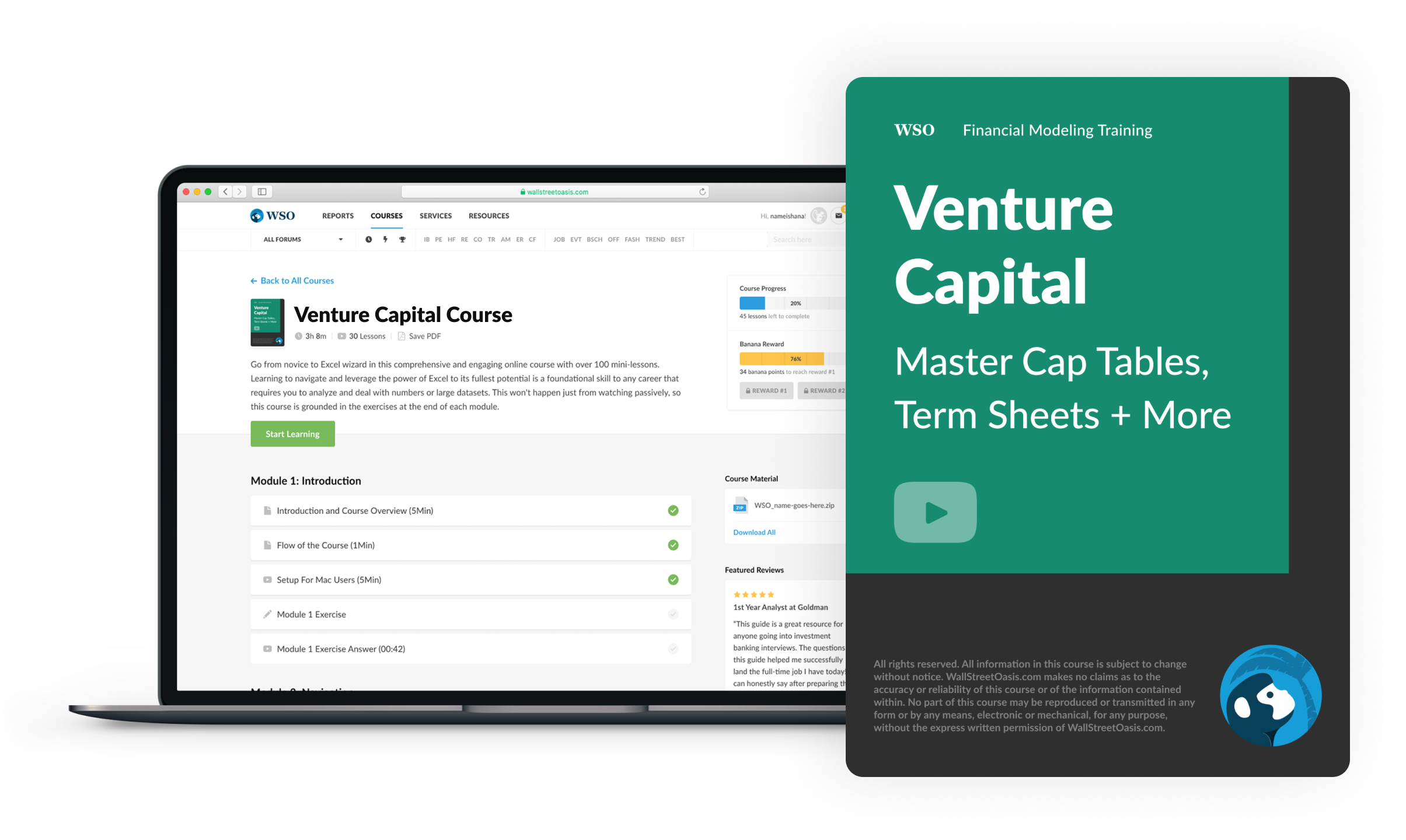
Venture Capital Interview Questions
Common technical, fit, behavioral, and logic venture capital interview assessments with sample answers.
Venture capital (VC), a subset of private equity, is a type of funding given by investors to start-ups and small companies with the potential for long-term growth.
5bbf.png)
Investment banks, other financial institutions, and rich investors are the usual sources of venture capital. It can also be given in management or technical skills; it need not always be in the form of money.
Because there is a lot of uncertainty, it increases the risk involved in the investment and its possible return. However, the prospective return is still attractive because it is above average.
For young businesses with a short operating history (less than two years), VC is increasingly becoming a welcome - even crucial - source of finance, especially if they lack access to capital markets, bank loans, or other forms of debt.
The primary disadvantage for startups is that investors typically receive shares in the company and, thus, have a voice in its choices.
Venture capitalists (VCs) often invest in startups with remarkable growth potential. Alternatively, they may choose quickly-expanding businesses that appear to be ready to expand further and whose founders have strong technical backgrounds but less management experience.
Investors and operators, venture capitalists, are both. They typically have a solid technical background and professional knowledge of operation and management, which helps them to comprehend the business model of high-tech enterprises.
Additionally, venture capitalists will assist entrepreneurs in improving the operation and management of their businesses.
One significant distinction between venture capital and other private equity transactions is that it frequently focuses on startup businesses seeking large sums of money for the first time.
However, private equity frequently invests in larger, more established businesses seeking an equity infusion or the chance for a company founder to transfer a stake.
Top Venture Capital Firms
beec.jpg)
Google's parent firm, Alphabet Inc., has a VC division called GV. Bill Marris established GV, formerly Google Ventures, in 2009 with a $100 million pledge to fund technology firms at the seed, venture, and growth stages.
The Global Investment Fund oversees the management of more than $8 billion in assets on behalf of more than 300 active enterprises.
Firms like Uber, Medium, Slack, GitLab, Cloudera, and more have received significant investment from GV.
GV invests in start-ups in a variety of industries, including agriculture, life sciences, software, hardware, and the Internet. It also makes investments in the healthcare, transportation, software, and hardware industries.

Founded in the United States, Bessemer Venture Partners is a multinational family business. Companies in the healthcare, consumer, and enterprise sectors are of particular interest to the firm.
Bessemer Venture Partners has invested in well-known tech businesses, including Bumble, Yelp, LinkedIn, Shopify, Twitch, and many others.
They manage $19 billion in assets.

Jerry Murdock and Jeff Horing launched Insight Partners in 1995. The business has its headquarters in New York City.
Partners at Insight invest in Internet, software, and technology companies in their early stages of development. The business asserts to have a staff of software enthusiasts and a diverse and scalable portfolio of software enterprises.
Companies like Pluralsight, Shopify, DeliveryHero, Salesloft, Smartsheet, and more have received investment from Insight Partners.
More than $30 billion in commitments from businesses have been raised so far. More than 400 prime investments and 200 portfolio purchases have attracted the interest of Insight's partners.

Index Ventures was established in 1996 and have European roots.
Since its inception in 1996, Index Ventures has expanded, making investments in a variety of businesses and raising about $5.6 billion. Over the years, venture partners have established headquarters in London and San Francisco and frequently appear on Forbes' Midas list.
Gaming, security, finance, and e-commerce are the main areas of concentration for Index Ventures. Companies like Facebook, Dropbox, and CodeAcademy are among the established and fledgling businesses in the firm's portfolio.

With its headquarters in Menlo Park, California, Sequoia Capital is an American private equity company investing in venture-backed firms since 1972. It specializes in seed, early-stage, and growth-stage investments in private technology companies.
Sequoia is a grouping of three different VC firms, one focused on China, one in India and Southeast Asia, and one in the United States and Europe.
Sequoia Capital has been an early investor in some of the top businesses in Silicon Valley. Companies like Instagram, Youtube, Google, Zoom, Apple, PayPal, and Whatsapp were Sequoia's early-stage investments.

Venture Capital Interview Questions
Why Do You Want a Job in Venture Capital? And, Specifically, Why Did You Want a Job With Our Firm?
Nearly all interviewers ask candidates this question.
Perform considerable study on the company before the interview to get knowledge about the business and its sector. Your response to this interview question should show that you are knowledgeable about the topic.
The most crucial thing is to convey your excitement for the VC sector while avoiding highlighting the high wages that go along with it.
Consider your excitement when watching seedlings. You will establish a connection with the interviewer if you are enthusiastic and make these points.
Also, mention how the organization with whom you are interviewing fits into your ideal career path. Is it possible to collaborate with a range of startups? Or do you wish to assist in the launch of a firm while staying up to date with ecosystem trends?
Talk about the talents you've developed throughout your career that are relevant to venture capitalists, as well as why the company needs you and not someone else. Talk about why your background is a great fit for the organization.
Tell Me About Your Most Challenging Professional Experience.
Ideally, you should demonstrate that you have excellent communication skills, an engaging personality, and an entrepreneurial mindset.
By choosing an experience from your CV that demonstrates precisely how your abilities will help you handle difficulties and challenges that may arise in a job in VC, you have a fantastic chance to create an impact.
An excellent example would be if you were trying to start a business, engaged in a truly exciting but challenging negotiation, or even if you had achieved remarkable success in your own life through sports, extracurricular activities, etc.
If you've worked on a business that was having trouble, you can utilize that experience to demonstrate how your leadership was able to turn things around or to highlight the lessons you took away from it.
For instance, talk about how your business launched a product or service that underperformed in initial market tests and how you may use that knowledge to develop alternate applications or features that ultimately lead to success.

Where Do You See Yourself in Five Years?
Job candidates should consider their short- and long-term professional aspirations before responding to hiring managers' inquiries.
If this question comes up during your VC interview, you should respond by mentioning your long-term goal of joining the company as a general partner.
You want to convey that you are serious about looking for a long-term relationship. Describe how allowing your work to speak for itself will help you get promoted.
What Are Some Recent Developments in the VC Industry?
A certain area of expertise is sought after by venture capitalists in job candidates.
You should not only show that you are familiar with the broad trends and advances in your sector but also go into detail about the specific influences that are now having an impact on the market. You should know which market developments are influenced by which elements.
It's critical to provide thorough responses rather than quick ones.
If possible, talk about current marketing initiatives, such as fundraising campaigns and mergers, to show that you are knowledgeable. A smart method for doing this is to choose a certain company's product launch or strategic choice.
What Has Been the Most Interesting IPO or Acquisition in Our Industry in the Past Year?
This inquiry focuses on topics including whether you believe there is a bubble, how the IPO market is doing, and other related topics.
This question is asked during interviews since VC firms frequently use the IPO market as one of their primary sources of investment. Thus you must be able to determine whether the market is doing well.
Prepare your analysis by learning the ins and outs of initial public offerings as they pertain to the interests of venture capital firms.
Talk about the company's potential and ways it could improve its market position. Consider this question as a chance to demonstrate your expertise in the field and as a way to wow the interviewer with a thorough response.
This study will also assist you in demonstrating to clients that you are familiar with their neighborhood and where they can go following an acquisition.
Which blogs/newspapers do you read?
Networking is essential in the venture capital industry because it is highly linked, especially if you want to bring new transactions to the table.
The opinions of well-known industry experts are highlighted in personal blogs or columns that discuss current deals, upcoming IPOs, and general industry commentary. You can gain insight into the industry's most recent trends and advancements by reading these publications.
Maintaining the conversation demonstrates to the interviewer that you are familiar with the firm and the industry. Choose your favorite blogs for venture capitalists, and be ready to respond to inquiries like "What's the current post?" and so forth.

How Would You Evaluate a Possible Portfolio Company and Its Business Plan?
Management potential and sales potential are two factors that are crucial to business success in the early stages of investing. Therefore, it is essential to comprehend how to assess a company's leadership in light of the market's facts.
The market perspective is crucial to any business endeavor. This idea should serve as the foundation of your response.
Which sector do you follow?
Your response must take into account the high level of specialization that venture capital firms frequently exhibit.
Choose two or three niche markets, such as artificial intelligence, online learning, health services, etc., and learn everything there is to know about them. You should be able to describe trends in great depth and be aware of the major players in the sector.
The next query will probably be, "So which businesses in this sector should we invest in?" and so forth. The easiest approach to get ready is to study the blogs and articles of prominent venture capitalists in a given industry, then base your own decisions on theirs.
Even though the employer might not agree with your plan, you will still greatly impress your interviewer if you can make a convincing argument for it. This shows that you are creative and have a keen understanding of the field.
What Have You Personally Invested In?
Being willing to take measured risks in exchange for potential long-term rewards is a key quality.
Display on your brokerage account that you own the greatest and most intelligent businesses in your sector and that you added them to your stock portfolio well in advance of the time when the hype took in the ordinary investor.
The interviewer will be impressed because this is what VCs do.
Additionally, the venture capital sector places a strong emphasis on early-stage growth enterprises and startups, so you should pay close attention to investing in businesses relevant to the area of expertise of the company you're speaking with.

The Parting Shot
Your last opportunity to set yourself apart from the competitors is during the last round of the interview.
Ask questions that relate to current business activities that weren't discussed during the interview. This demonstrates your interest in the firm.
Being well-prepared for these inquiries will provide you with a strong foundation if you've already been offered an interview with a venture capital firm. By doing the homework, you'll be one step closer to getting the job.

Everything You Need To Break into Venture Capital
Sign Up to The Insider's Guide by Elite Venture Capitalists with Proven Track Records.


or Want to Sign up with your social account?